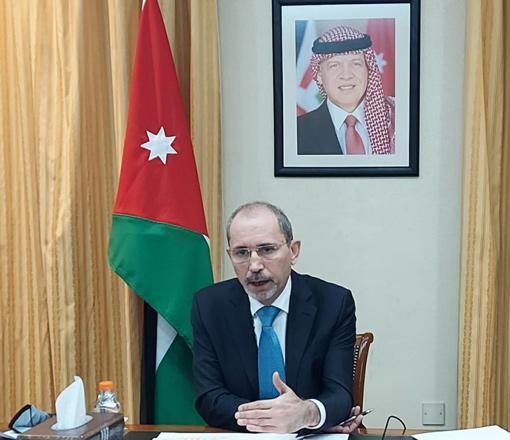- Local News
- Web-2021-02-24 | 02:15 pm

Nayrouz News Agency :
Deputy Prime Minister and Foreign Minister Ayman Safadi on Tuesday partook in the ministerial meeting of the Ad Hoc Liaison Committee (AHLC) for coordinating international aid to the Palestinian people.
During the virtual meeting headed by Norwegian Foreign Minister Ine Eriksen Soreide, Safadi stressed the importance of supporting the Palestinian economy.
He, nonetheless, noted that "no economic solution can be rendered an alternative for a political solution”, according to a Foreign Ministry statement.
He called for relaunching "serious and effective” negotiations to achieve a just and comprehensive peace based on the two-state solution that guarantees the establishment of an independent and sovereign Palestine on the June 4, 1967 lines, with East Jerusalem as its capital, in accordance with international law.
Chances of achieving peace are undermined by Israeli settlement policies, confiscation of homes, annexation and other illegal actions, he said, reiterating the necessity of crystallising an effective international stance to stop these illegal measures.
Providing financial funding to the United Nations Relief and Works Agency (UNRWA) to enable it to continue providing its services to millions of Palestinian refugees according to its UN mandate is crucial, Safadi said.
The Jordanian foreign minister also pointed to the significance of the positive gestures undertaken by the new US administration, voicing Jordan’s aspiration to work with it to achieve peace.
He also stressed the continuation of work with partners in Europe and the international community in order to achieve said peace, which constitutes a strategic choice and a necessity for regional and international security and stability.
The meeting was attended by Palestinian Prime Minister Mohammed Shtayyeh, the High Representative of the European Union for Foreign Affairs and Security Policy Josep Borrell, Tunisian Foreign Minister Othman Jerandii and representatives of member states.
The AHLC was formed in 1993 by the Multilateral Steering Group for Peace in the Middle East within the framework of the Washington Conference after the signing of the Oslo Accords.
The committee aims to help Palestinians build the capabilities and institutions of the state and coordinates between donors, the Palestinian Authority and the Israeli government.
The committee, which holds two annual meetings, is chaired by Norway and includes 15 members: Jordan, Egypt, Saudi Arabia, Tunisia, Russia, the US, Japan, Canada, the Palestinian National Authority, the EU, Israel, the UN, the International Monetary Fund and the World Bank Group.








